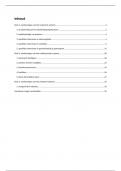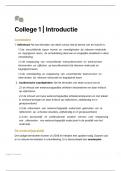GGH2604
Assignment 2 Semester 1 2024
Detailed Solutions, References & Explanations
Unique number: 800071
Due Date: 27 March 2024
Part A
The African region has been experiencing rapid urbanization in recent years, leading to
significant changes in the environment. Urbanization is a complex process that involves the
growth of cities and towns, accompanied by the expansion of infrastructure and the influx
of people into these urban areas. This phenomenon has profound effects on the
environment, particularly in terms of habitat loss and destruction, as well as pollution
associated with urban environments. This essay critically examines the anticipated effects
of human activities on the environment in the African region through urbanization, with a
specific focus on these two aspects.
, Part A
The African region has been experiencing rapid urbanization in recent years, leading
to significant changes in the environment. Urbanization is a complex process that
involves the growth of cities and towns, accompanied by the expansion of
infrastructure and the influx of people into these urban areas. This phenomenon has
profound effects on the environment, particularly in terms of habitat loss and
destruction, as well as pollution associated with urban environments. This essay
critically examines the anticipated effects of human activities on the environment in
the African region through urbanization, with a specific focus on these two aspects.
Habitat loss and destruction are among the most significant consequences of
urbanization in the African region. As cities expand, natural habitats such as forests,
wetlands, and grasslands are increasingly being converted for human use. This
includes the construction of residential and commercial buildings, roads, and other
infrastructure, as well as agricultural activities. The loss of natural habitats not only
directly reduces the available living space for numerous species of plants and animals
but also contributes to habitat fragmentation, which further exacerbates the negative
impacts on biodiversity and ecological processes.
According to a study by Barnes et al. (2017), the expansion of urban areas in sub-
Saharan Africa has led to significant habitat loss for many species, particularly those
with specific habitat requirements. Furthermore, the conversion of natural habitats for
urban development often results in the displacement or even extinction of indigenous
species, as they are unable to adapt to the new environment or find suitable alternative
habitats. This loss of biodiversity has far-reaching consequences for the ecosystem,
as it disrupts the delicate balance of the food web and other ecological processes.
In addition to habitat loss, the process of urbanization also brings about various forms
of pollution that have detrimental effects on the environment in the African region.
Urban areas are major sources of air and water pollution, as they are characterized by
high levels of industrial, vehicular, and domestic activities. The combustion of fossil
fuels for energy production and transportation, as well as the discharge of untreated
wastewater and solid waste, contribute to air and water pollution, which have direct
impacts on the health of both humans and wildlife.
Assignment 2 Semester 1 2024
Detailed Solutions, References & Explanations
Unique number: 800071
Due Date: 27 March 2024
Part A
The African region has been experiencing rapid urbanization in recent years, leading to
significant changes in the environment. Urbanization is a complex process that involves the
growth of cities and towns, accompanied by the expansion of infrastructure and the influx
of people into these urban areas. This phenomenon has profound effects on the
environment, particularly in terms of habitat loss and destruction, as well as pollution
associated with urban environments. This essay critically examines the anticipated effects
of human activities on the environment in the African region through urbanization, with a
specific focus on these two aspects.
, Part A
The African region has been experiencing rapid urbanization in recent years, leading
to significant changes in the environment. Urbanization is a complex process that
involves the growth of cities and towns, accompanied by the expansion of
infrastructure and the influx of people into these urban areas. This phenomenon has
profound effects on the environment, particularly in terms of habitat loss and
destruction, as well as pollution associated with urban environments. This essay
critically examines the anticipated effects of human activities on the environment in
the African region through urbanization, with a specific focus on these two aspects.
Habitat loss and destruction are among the most significant consequences of
urbanization in the African region. As cities expand, natural habitats such as forests,
wetlands, and grasslands are increasingly being converted for human use. This
includes the construction of residential and commercial buildings, roads, and other
infrastructure, as well as agricultural activities. The loss of natural habitats not only
directly reduces the available living space for numerous species of plants and animals
but also contributes to habitat fragmentation, which further exacerbates the negative
impacts on biodiversity and ecological processes.
According to a study by Barnes et al. (2017), the expansion of urban areas in sub-
Saharan Africa has led to significant habitat loss for many species, particularly those
with specific habitat requirements. Furthermore, the conversion of natural habitats for
urban development often results in the displacement or even extinction of indigenous
species, as they are unable to adapt to the new environment or find suitable alternative
habitats. This loss of biodiversity has far-reaching consequences for the ecosystem,
as it disrupts the delicate balance of the food web and other ecological processes.
In addition to habitat loss, the process of urbanization also brings about various forms
of pollution that have detrimental effects on the environment in the African region.
Urban areas are major sources of air and water pollution, as they are characterized by
high levels of industrial, vehicular, and domestic activities. The combustion of fossil
fuels for energy production and transportation, as well as the discharge of untreated
wastewater and solid waste, contribute to air and water pollution, which have direct
impacts on the health of both humans and wildlife.




